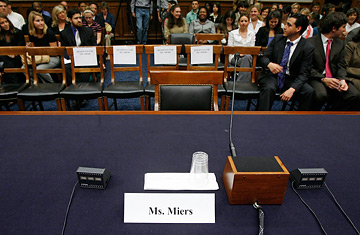
The witness chair where former White House counsel Harriet Miers was supposed to sit while testifying before the U.S. House Commercial and Administrative Law Subcommittee July 12, 2007.
The only sign that Harriet Miers was supposed to testify in front of Congress on Thursday was literally that — a sign, a paper placard bearing her name. Behind it sat an empty water cup. Behind that, an even emptier chair.
The former White House Counsel (and short-lived Supreme Court judicial nominee) defied a subpoena by a Congressional subcommittee, where she had been scheduled to answer questions on the Administration's controversial firings of federal prosecutors. The day before, Miers' attorney announced that she would heed President Bush's claim of executive privilege and not testify. In response, Rep. Linda Sanchez, a California Democrat and chairwoman of a House Judiciary subcommittee, ruled that the President's claims of executive privilege on behalf of Miers were not legally valid, setting into motion a process that could potentially result in charges of contempt being filed against the former aide.
"Ms. Miers' refusal to comply with the subpoena and appear at this hearing, and to answer questions and provide relevant documents regarding these concerns, cannot be properly justified on executive privilege or related immunity ground," Sanchez said of her ruling, which was upheld along party lines. Such a decision is the first step towards bringing potential contempt charges against Miers, which would eventually have to be voted on by the full committee followed by the entire House — and then actually prosecuted by, who else, the Justice Department. No timeline has yet been set as to when — or if — such a step will be taken, and if it was, a long legal battle would almost certainly ensue. Those found guilty of contempt of Congress are subject to up to a year in prison.
The standoff came a day after former White House political aide Sara Taylor testified in front of the Senate Judiciary committee on the same topic — whether the firing of federal prosecutors in 2006 was politically motivated. Taylor toed a thin line with her testimony, invoking the President's executive privilege at most points while maintaining that Bush was not involved in the situation. The White House contends that both she and Miers fall under a Justice Department opinion which concluded that senior presidential advisors can no more be compelled to abide by a Congressional subpoena than the President, regardless of whether they are currently in the employ of the President or not.
Michigan Rep. John Conyers, a Michigan Democrat and chair of the House Judiciary committee, regarded Miers' no-show as an affront when he asked, "Are Congressional subpoenas to be honored, or are they optional?" His was one of the morning's calmer statements, with Utah Rep. Chris Cannon, the ranking Republican member, calling the entire investigation a "preposterous, prefabricated, partisan scam" and Rep. Stephen Cohen, a Tennessee Democrat, calling for a contempt citation, saying "What we've got here is an empty chair. That's as contemptuous as anybody can be of the government."
The White House, in response, accused the committee of engaging in "political spectacle" and called for it to withdraw its subpoenas. Its repeated offers to make Miers and others available for private, non-transcribed interviews have been rejected by Democrats who prefer witnesses be under oath. "I can't think of a more confrontational approach than attempting to compel testimony through a subpoena," said White House spokesman Tony Fratto.
Stephen Hess, a former White House staffer and current scholar at The Brookings Institute, has seen the executive privilege card played a few times — with former Presidents Richard Nixon and Bill Clinton — but it usually is resolved by some sort of compromise before it reaches the courts. That might not happen this time. "There's less of a chance of this being settled out of court, both because of what's involved and even because of the psychological stakes on both sides. I don't see anybody who wants to settle out of court, which is too bad because every time these things do go to court, the concept of executive privilege gets winnowed down just a little bit more."
Regardless of the outcome of the executive privilege battle, the volleys will continue against the White House and Justice Department, especially against Attorney General Alberto Gonzales, whose resignation has been called for by Senators on both sides of the aisle. He is next scheduled to testify before the Senate Judiciary committee on July 24 regarding oversight at the Justice Department. Chances are he'll at least show up.
